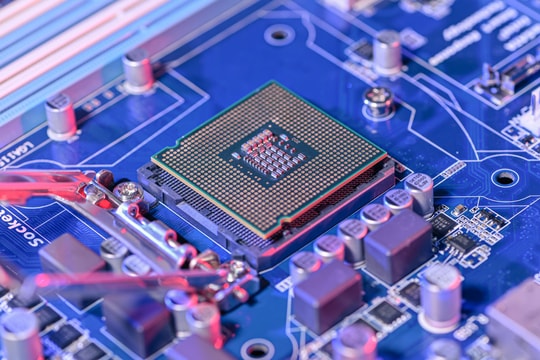China threatens to take 'necessary action' if US tightens semiconductor chip restrictions
On November 28, China warned that it would take "necessary actions" to protect the interests of domestic businesses if the US continued to strengthen controls on the semiconductor industry.
China's warning comes after reports that the Biden administration is considering new export restrictions, expected to be announced this week, aimed at limiting the supply of advanced semiconductor technology and components to China, in order to protect national security interests and maintain America's technological edge in the international arena.

Last week, the US Chamber of Commerce emailed its members, revealing that the Biden administration is considering adding about 200 more Chinese chipmakers to its trade blacklist.
If implemented, Chinese companies would face severe restrictions, including banning most US suppliers from selling or transferring technology, equipment, and components needed for their manufacturing operations, a move that could escalate tensions in the technology sector between the world's two largest economies.
At a regular press conference on November 28, when asked about the above report, Chinese Ministry of Commerce spokesman He Yadong strongly voiced his opposition. He stressed that China "resolutely opposes" the US's arbitrary expansion of the concept of national security, and accused the Washington administration of "abusing" export control measures to put pressure on Chinese businesses.
The US's increased controls on the semiconductor industry stem from concerns that China could leverage these advanced technologies to develop advanced weapons systems, improve surveillance capabilities and enhance its overall military capabilities.
The measures are aimed not only at restricting the export of high-end chips but also at related technologies, such as chip manufacturing equipment and design software, aimed at preventing Beijing from making major strides in strategic technology areas.
"These actions not only seriously disrupt the international economic and trade order, but also shake the stability of the global industrial supply chain. At the same time, they undermine cooperative efforts between China and the US, causing huge losses to the global semiconductor industry," Mr. He Yadong emphasized.
"If the US persists in strengthening controls, China will take necessary actions to resolutely protect the legitimate rights of Chinese enterprises," He Yadong threatened.
Bloomberg news agency reported that the administration of President Joe Biden is considering imposing new restrictions to tighten the sale of semiconductor manufacturing equipment and artificial intelligence (AI) memory chips to China, which is seen as the next move in Washington's efforts to curb Beijing's technological ambitions.
Citing people familiar with the matter, Bloomberg said the Biden administration's latest proposal is narrower in scope than initially expected, with a significantly reduced number of Huawei suppliers affected. Notably, ChangXin Memory Technologies, a company working on developing advanced AI memory chip technology, is not on the list of targets this time.
The new proposal does not focus directly on controlling semiconductor chips, but instead targets two chip factories owned by Semiconductor Manufacturing International Corp. (SMIC), a key Huawei partner, according to the report.
In addition, more than 100 Chinese companies that specialize in manufacturing equipment for the semiconductor industry are also in the target of these measures, which are seen as an effort to cut off the supply of equipment and technology needed to manufacture advanced chips in China.
President Joe Biden is expected to leave office next January, amid concerns that President-elect Donald Trump's trade policies, particularly his pledge to impose more tariffs on China, could spark a new trade war.
This week, President-elect Donald Trump pledged to impose an additional 10% tariff on all goods imported from China, a move that would significantly increase the cost of products from the country.
The new tariffs would be higher than any existing tariffs in his trade policy toward China, surpassing previous tariffs imposed in previous rounds of trade tensions, and could further aggravate economic relations between the two countries.
China's Ministry of Commerce has strongly responded to the new US tariff plan, stressing that these tax measures will not be able to solve the US's internal economic and political problems.
China's Ministry of Commerce said that the increase in tariffs not only harms businesses and consumers of both countries but also fails to address the fundamental problems facing the US economy, warning that this could lead to negative consequences for the global economy.


.jpg)


